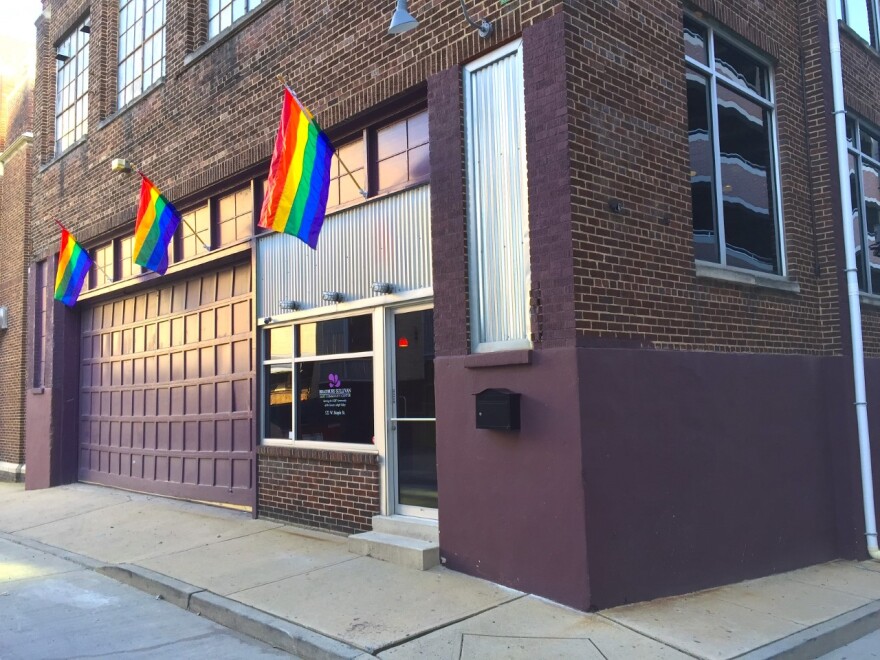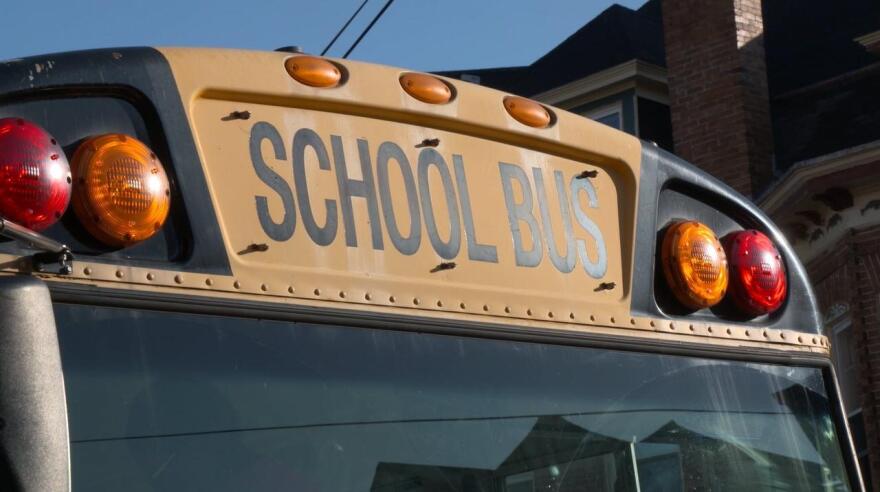Last of two parts
ALLENTOWN, Pa. — Since the Nov. 5 election of Donald Trump to a second term as president, activists and support workers in the Lehigh Valley's LGBTQ community say its members are scared that rhetoric could turn into harm.
But the Lehigh Valley's LGBTQ community also is looking for ways to move forward in that atmosphere, leaders say.
Corinne Goodwin, president of the Eastern Pennsylvania Transgender Equity Project, a group that provides legal guidance and resources to transgender people, said the "core issue" is that the majority of Americans still say they don't know someone who is transgender.
"It's just human nature that you tend to fear what you don't know, right?" Goodwin said. "When you don't know trans folks or trans youth, you're automatically sort of fearful of that unknown.
"And then when these messages — of that, you know trans people are out to harm your kids, or trans people are going to keep your kid from getting a scholarship, or trans people are going to, you know, you know, those trans women are bigger, stronger or leaner, meaner than, you know, cisgender kids.
"It just amplifies that initial kind of fear of the unknown. And again, it activates voters, and it activates contributors to the campaign."
According to a 2021 Pew Research study, only about 42% of Americans know someone who is transgender or uses gender-neutral pronouns.

"Every kid in Gen Z knows somebody who is part of the LGBT community," said Liz Bradbury, chairwoman of the LGBTQ+ political action organization Keystone Equality and co-founder of the Bradbury-Sullivan LGBT Community Center in Allentown. "They don't want to harm their friends.
"[So] what's the justification? Well, they're a smaller minority, so we can pick on them. We can inflame the world to make them think that they're doing something really terrible to the community."
Bradbury said she believes acceptance of transgender people publicly threatens the status quo about gender roles and autonomy, and that rhetoric against transgender people by conservative activists seeks to "scare them back into the closet" to fight against that.
As a result, Bradbury argued, youth are made to feel that they cannot live out their own identity.
Bradbury said those who seek to be supportive amidst the rhetoric should actively show and voice support for the LGBTQ community and be concerned about candidates stating or supporting the divisive rhetoric.
Sports and schools
Where transgender women should compete in sports remains a controversial issue.
The regulatory body of a given sport typically is what decides rules regulating or barring the eligibility of transgender athletes.
Bodies that allow transgender women to participate in women's events often have requirements related to sex hormone therapy for a specific time or at specific levels, which is results in significant decreases in muscular strength.
In recent years government regulation barring transgender womenfrom competing in women's sports has become law in more than 20 states, saying there are inherent unfair differences and physical advantages for people born male.
In Pennsylvania, recent years have seen heated debates about ultimately failed legislation to restrict transgender athletes.
“Over the past half-century, we have fought to protect athletic opportunities for female students,” state Sen. Judy Ward, R-Blair County, one of the main sponsors of legislation restricting transgender athletes.

“And now these opportunities are in jeopardy.”
Some districts, such as Central Bucks School District and Pennridge School District, have adopted district-level restrictive policies.
Under current Pennsylvania Interscholastic Athletic Association rules, in situations where a student's gender is questioned or uncertain, the school principal is to determine their eligibility.
Creating better citizens
Goodwin argues that participation in school sports creates better citizens — teaching youth to play by the rules, win with dignity, lose with grace and work as a team.
All of that prepares them in different ways for careers, Goodwin said.
"So why would you want to take those lessons and those opportunities away from anybody?" she said.
The LGBTQ+ community in Pennsylvania can find some reassurance in the divided government, Bradbury said, pointing to the Democratic majority in the state House of Representatives and the support of Gov. Josh Shapiro.
"We still have lots of layers of government in the United States," Bradbury said.
"We have other levels of protection. This certainly wasn't a mandate election in any possible way. There's a [nearly] 50/50 split. So it's not like this is every single person feels this way."
Shapiro previously called the state House legislationbarring transgender women from sports as “nothing more than cruel, designed to discriminate against transgender youth who just want to play sports like their peers.”
'They're not being affirmed'
School board meetings often have become hotbeds of public debate for LGBTQ issues.
A Southern Lehigh School Board meeting last year amidst school board elections brought a crowd of people to debate the issue of students using facilities corresponding with their gender identity.
Many candidates had signed a pledge to "Reject Woke Politics in our Schools" and "Recognize and Respect our Biological Differences," notifying parents if children publicly begin to transition genders and re-evaluating the school's bathroom policy as it relates to gender.
Student Finn Bull, who is transgender, said at the time he is too afraid to use the bathroom that corresponds with his gender identity.
"For me personally, I use the one I'm assigned at birth because I am afraid I will be assaulted or I will be sexually assaulted for going to somewhere I'd prefer or would like to go," Bull said.
"But the fear of a bunch of guys hurting me or attacking me because I have a bigger chest or I act more feminine is terrifying because I don't want to come home hurt or bleeding. That would be terrifying."
Doug Durham, chairman of the Southern Lehigh Republican Committee, argued at the meeting that female students are in danger from transgender students who were assigned male at birth.
He disagreed that transgender students are protected by Title IX.
"We need to be aware that there are female students that will not use the bathrooms going from the intermediate, the middle school and the high school — will not use their assigned bathrooms for fear of running into a biological boy," he said.
"Their concerns should be affirmed and they're not being affirmed."
Lehigh County protections
This year, Lehigh County passed an expansive non-discrimination law for LGBTQ, disabled and other individuals part of a set of protected classes.
Approved by a 6-3 vote of Lehigh County commissioners, it outlaws discrimination in education, employment, health care, housing and public accommodations in all of Lehigh County.
The protected classes listed include gender identity, gender expression, and sexual orientation in addition to actual or perceived race, ethnicity, color, religion, creed, national origin or citizenship status, ancestry, sex and other traits.
"This exact rhetoric coming from a presidential candidate and his leadership team is why I was so steadfast in passing a non-discrimination ordinance more progressive than the current state or federal law," said Lehigh County Commissioner Zach Cole-Borghi, who led passage of the legislation.

"We have seen what his rhetoric has led to on January 6th [2021], and I am happy the Lehigh County protected class residents have an ordinance in place to prevent discrimination."
Republican Lehigh County commissioners opposing the bill voiced support for alternate enforcement mechanisms and advocated for an alternate bill, but still voiced legislative support for protections for LGBTQ people in the county.
Still are struggles
Bradbury spoke of the change she has seen in public support for the LGBTQ community, and how struggles have changed from a denial of the community to more acceptance for their support.
"Nobody says they don't want gay people to live in a historic district anymore," said Bradbury, who is also chairwoman of the newly formed Lehigh County Human Relations Commission.
But in both the legal and social landscape, there still are struggles.
Discrimination based on sexual orientation and gender identity is not explicitly banned in the state, but Shapiro has called to expand non-discrimination laws to protect LGBTQ+ Pennsylvanians statewide.
Pennsylvania currently has formal nondiscrimination protections for LGBTQ people via a regulatory change and interpretation enacted under then-Gov. Tom Wolfin 2022, but legislative codification has not yet passed.
In Pennsylvania, laws such as the Pennsylvania Human Relations Act and Pennsylvania Fair Educational Opportunities Act prohibit discrimination based on race, color, religious creed, ancestry, age (40 and over), sex, national origin, familial status (only in housing), handicap or disability and the use, handling, or training of support or guide animals for disability.
In response to the limited statewide coverage, many municipalities and counties have moved to enact their own non-discrimination legislation explicitly codifying LGBTQ+ and other protections.
Among those municipalities are Allentown, Bethlehem, Easton, Reading, Philadelphia and Pittsburgh. Lehigh County now joins those municipalities.
The local laws offer protection to about a third of Pennsylvania’s population in access to housing, employment and public accommodations, according to the state attorney general office.
"If you live in Northampton, if you live in Williams or Quakertown, or you live in any of these communities that are outside of these jurisdictions, you don't have a recourse," Goodwin said.
"The only recourse is to make a complaint to the state, and the state doesn't have statewide protections.
"Currently, the Pennsylvania Human Relations Commission is interpreting the Pennsylvania Human Relations Act to cover gender identity and gender and gender expression.
"But you get a change in government leadership, and that could change, as well."
State protections
Goodwin and Bradbury advocated for the passage of the Fairness Act, a bill expanding non-discrimination protections throughout the state based on sex, sexual orientation or gender identity or expression.
Most recently, the non-discrimination law passed the Pennsylvania State House this year, but has not been brought to a vote in the Senate.
Broader coverage against discrimination toward LGBTQ people exists in bordering states New York, New Jersey and Maryland.
Goodwin argued that it should be codified so that it would keep people in communities, keep tax bases up in local municipalities, and prevent costs related to losing an employee who quit because of harassment allowed in the workplace.
"We need to talk about, ultimately, what stigmatization and marginalization does from a macro perspective," Goodwin said.
Next steps for activists
Goodwin said that in the meantime, exposure is the most important thing that can change minds, either by doing it as an ally or supporting an organization that does that work.
She said it's important to remind people that transgender Americans are more likely to be assaulted or disowned by family members, causing housing struggles and other challenges as a result.
Goodwin also said meeting transgender and LGBTQ people and interacting face-to-face is a meaningful way to reduce fear and bring about change.

"I have a friend who joined a bowling league with a bunch of senior citizen folks, right?" Goodwin said. "And they all love her. They had never met a transgender person before.
"So just by going bowling, she made like, you know, 40 other allies who will now become equality voters."
Shiloh Sidor of the Nazareth area, who is nonbinary, said, "I am angry, and disappointed, but I am not afraid.
"Many things seem uncertain but I know that the trans community is not going anywhere. I have heard outrageous tales of humiliation, suffering, abandonment, and violence that trans people have endured.
"Yet these same people are always the first ones to reach to help others. The kindness and strength of trans people is without parallel and inspires me daily."
Bradbury said LGBTQ people who are scared right now need to find their chosen family, and use that core group of support to give them strength.
"I think what people have to say to their friends and their family and their loved ones, you know, I will protect you," Bradbury said.
"We'll do everything we can to protect you, and with regard to fairness and equality.
"I remember what it was like being a transgender person in the 1970s and the 1980s and the 1990s and the early 2000s — and it's better now than it was then.
"The reason we were able to make it better is because we got out there and we started becoming active and letting people know about the challenges of our community."
Goodwin said that what those concerned should do is actively voice support to transgender people in their lives or support activist organizations such as hers, ACLU Pennsylvania or the Pennsylvania Youth Congress with funds or volunteering.
She said action days are planned in Harrisburg to advocate for legislation that would protect LGBTQ people, specifically the fairness act.


